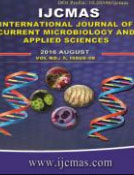


 National Academy of Agricultural Sciences (NAAS)
National Academy of Agricultural Sciences (NAAS)

|
PRINT ISSN : 2319-7692
Online ISSN : 2319-7706 Issues : 12 per year Publisher : Excellent Publishers Email : editorijcmas@gmail.com / submit@ijcmas.com Editor-in-chief: Dr.M.Prakash Index Copernicus ICV 2018: 95.39 NAAS RATING 2020: 5.38 |
Rice (Oryza sativa L.) is the primary source of food, nutrients, energy and employment. Productivity of rice is low usually due to drought salinity, nutrients deficiency etc. Soil phosphorus (P) deficiency is one of the major factors that adversely affecting plant growth causing early maturity in rice and significant reduction in grain yield. Recent studies on mitigation of P deficiency stress suggests that rice plant exhibits adaptive mechanisms to increase “P” uptake and enhance its utilization under deficient condition and several genes and signaling cascades involved in this response have been reported. As evident from these studies, increase in P uptake alone doesn’t provide an advantage over P deficient condition, in terms of higher grain yield which is reflected by P utilization efficiency (PUE). With this view the present study was conducted to study the response of rice roots in relation to grain yield under P deficiency stress in F2 segregating lines derived from cross between Sahbhagi Dhan and RRF-78. Field evaluation of the 330 F2 lines indicated significant variations in plant height, total no. of tillers, biological weight and grain yield. For analysis of root trait 5 lines were selected from two extremes. Almost half of all of the 10 genotypes showed increase in root length (RL) and 6 of them showed increase in root volume (RV) and root surface area (RSA). Expression analysis of 9 genes including phosphorus starvation signaling (OsPHR1, OsPHR2, OsPHR3, OsLTN1,OsMYB2P-1), Pi transporter (OsPT1),) and NRR locus related genes (Ehd1, Hd3a, RH3) showed differential expression of 5 genes (OsMYB1, OsPHR1, OsPHR2, OsPHR3 and OsPTI) in root tissues under P deficiency stress. On the basis of field evaluation, root trait study and expression analysis, SDXRRF-78(14) and SDXRRF-78(20) were identified as promising P deficient tolerant genotypes.
 |
 |
 |
 |
 |